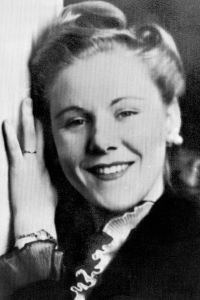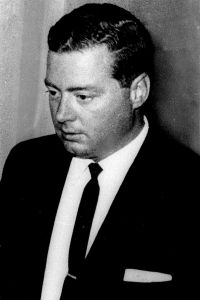While we celebrate Mrs. Liuzzo’s courageous decision to join Dr. King’s voting rights movement, we also should reflect on something else that makes her tragedy unique: one of the men in that car was the Federal Bureau of Investigation’s top informant inside the Alabama Klan. Gary Thomas Rowe’s career reveals how intelligence agencies used informants not only in the 1960s but continue to do so today as they fight organized crime and domestic and foreign terrorists. Rowe’s story suggests that informants can actually instigate the very crimes they are supposed to prevent.
In March 1960, Rowe was living in Birmingham, working as a machinist and nightclub bouncer when he was encouraged by the FBI to join the Eastview Klavern of the Alabama Knights of the KKK. His FBI handler warned him that he was not an official agent and, if he committed violent acts, he would be prosecuted like a common criminal. But the handler also appreciated that in order to protect his cover, Rowe might have to use force to defend himself. This was not a problem for Rowe. He loved a good fight and fancied himself an “undercover man,” a Southern James Bond who believed he had been given permission to raise hell without suffering the consequences.
He joined the Klavern, and quickly rose within its ranks. In May 1961, Rowe was the intermediary between the Klan and Birmingham’s Public Safety Director, Eugene “Bull” Connor, who gave the Klan a 15-minute head start to attack a busload of Freedom Riders when they arrived in the city. Rowe warned the FBI of the coming attack, but FBI Director J. Edgar Hoover kept it secret from Attorney General Robert Kennedy and the bureau did nothing to stop the assault. A classified Justice Department report later admitted that “Rowe was one of the handful most responsible for the violence.” Before the police arrived, he and other Klansmen beat African-American George Webb and other bystanders with their fists and pipes.
The FBI’s response to Rowe’s actions that day revealed how an informant can escape punishment for his crimes. Rowe told his handler what he’d done, but the agent assured Washington that “Rowe was not personally involved in the fighting…” Instead of being arrested, Rowe received a cash bonus of $175 and the praise of a grateful government. His handler told him he was “without doubt the most alert, intelligent, productive and reliable informant…currently being operated.” Nor were those closest to Rowe inside the Klan arrested, as that might have exposed the informant.During the years that followed, Rowe continued to attack African-Americans and civil rights workers without fear, knowing that the FBI would protect him from prosecution. He may also have been involved in the 1963 bombing of the 16th Street Baptist Church that killed four young girls and maimed a fifth, possibly even steering the FBI away from those responsible for that terrible crime.
Rowe’s ability to commit crime and escape arrest led some Klansmen to believe that he was an FBI informant but Rowe was always able to fight off such suspicions. Eventually, some of them came to believe that it would be advantageous to have an FBI informant inside the Klavern, as the Bureau’s shield would protect them as well as Rowe.
In fact, while the evidence points to another Klansman as the one who fired the shot that killed Mrs. Liuzzo on March 25, 1965, Rowe’s presence in the car may well have encouraged the group to chase after Mrs. Liuzzzo on Highway 80 and fire their guns with impunity. If so, this time they were wrong.
After the Liuzzo shooting, Rowe quickly made a deal with the Justice Department: In exchange for immunity from prosecution, he agreed to testify against his fellow Klansmen. His eyewitness testimony led to the Klansmen’s conviction for violating Mrs. Liuzzo’s civil rights and 10 year prison sentences. Without Rowe’s testimony, the three other Klansmen never would have been caught, as the crime occurred at night on a lonely highway.
It was the highpoint of Rowe’s career and one that illustrates the problematic nature of using informants: Rowe solved a crime which his very presence may have encouraged. He was again rewarded, now with a gift of $10,000, a new identity, and a job as an assistant US marshall in California.
Unfortunately, his habitual brawling and drinking cost him that job a year later. He blamed the FBI for his troubles. In 1975, Rowe testified before Senator Frank Church’s committee investigating illegal acts by the FBI, CIA and NSA, revealing his (and the FBI’s) complicity in the 1961 attack on the Freedom Riders and other civil rights-related crimes. Rowe spent the remainder of his life working as a private investigator in Savannah, Georgia. He died there in 1998.
While Rowe and the Klansmen are dead and the Liuzzo case is closed, the US government continues to use informants, with predictable results. In the fight against organized crime in the 1980s, the FBI used career criminal Whitey Bulger as an informant, allowing him to commit numerous crimes including murder, in exchange for information. That association corrupted two top officials in the bureau’s Boston field office, ultimately ruining their careers and severely damaging the FBI’s reputation.
In 2009, CIA officers in Afghanistan thought they had achieved a major coup by winning over a Jordanian doctor who promised to penetrate Al Qaeda. On December 30, while visiting the CIA’s base near the city of Khost, he blew himself up, also killing seven CIA officers and contractors, and wounding many others.
The case of Gary Thomas Rowe and many others shows how dangerous it is to plant unreliable citizens inside terrorist groups. To protect their cover, they often must commit criminal acts. Our government becomes their accomplice. As we honor Mrs. Liuzzo’s life, let us also re-examine the role played by an FBI informant in how she died.
The views expressed in this post are the author’s alone, and presented here to offer a variety of perspectives to our readers.





